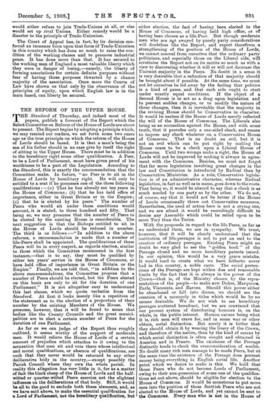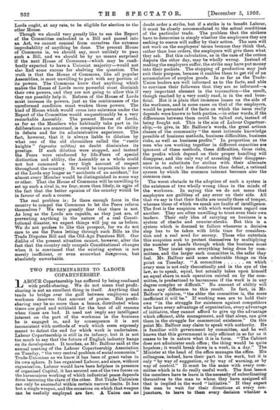THE REFORM OF THE UPPER HOUSE.
THE Standard of Thursday, and indeed most of the papers, publish a forecast of the Report which the Select Committee on Reform of the House of Lords are about to present. The Report begins by adopting a principle which, we may remind our readers, we set forth some two years ago as the true principle on which the reform of the House of Lords should be based. It is that a man's being the son of his father should in no case give by itself the right of sitting in the Upper House. There must be in addition to the hereditary right some other qualification. A Peer, to be a Lord of Parliament, must have given proof of his worthiness to be a part of the Legislature. According to the Standard, this is exactly the recommendation that the Committee make. In future, "no Peer is to sit in the House of Lords by hereditary right. He will only be entitled to a seat if he possesses one of the three following qualifications :—(a) That he has already sat ten years in the House of Commons; (b) that he has held office of importance, either in Great Britain or in the Empire ; (c) that he is elected by his peers." The number of Peers who would sit under these conditions would amount, it is stated, to three hundred and fifty. That being so, we may presume that the number of Peers to be elected by the existing House is considerable. The next suggestion is that the Bishops entitled to sit in the House of Lords should be reduced in number. The third is as follows :—" In addition to the above reforms, a recommendation is made that a number of life-Peers shall be appointed. The qualifications of these Peers will be in every respect, as regards election, similar to those which the Committee recommend in the first instance,—that is to say, they must be qualified by either ten years' service in the House of Commons, or have held office of importance in Great Britain or the Empire." Finally, we are told that, "in addition to the itbove recommendations, the Committee propose that a number of Peers should be elected, but the Peers elected on this basis are only to sit for the duration of one Parliament." It is not altogether easy to understand this last clause, which we quote verbatim from the Standard. At first it looks merely like a repetition of the statement as to the election of a proportion of their number by the existing Members of the House. We presume, however, that it will be found to mean that bodies like the County Councils and the great munici- palities are to elect a certain number of Peers for the duration of one Parliament.
As far as we can judge of the Report thus roughly outlined, it seems worthy of the support of moderate men. It would relieve the House of Lords of a certain amount of prejudice which attaches to it owing to the accusation that men sit and vote there whose intellectual and moral qualifications, or absence of qualifications, are such that they never would be returned to any other deliberative body in the country,—except possibly the Parish Council where they own the whole parish. In reality this allegation has very little in it, for as a matter of fact the black sheep of the House of Lords and the half- witted or quarter-witted Peers exercise not the slightest influence on the deliberations of that body. Still, it woul4 be all to the good to exclude both these elements, and, as we have said above, to make the essential qualification for Lord of Parliament, not the hereditary qualification, but either election, the fact of having been elected to the House of Commons, of having held high office, or of having been chosen as a life-Peer. But though moderate men who are mit swayed by purely party considerations will doubtless like the Report, and expect therefrom a strengthening of the position of the House of Lords, we cannot conceal from ourselves that the ordinary party politicians, and especially those on the Liberal side, will scrutinise the Report not on its merits so much as with a view to discovering whether it will or will not decrease the Unionist majority in the Peers. No doubt in a sense it is very desirable that a reduction of that majority should be brought about if possible. At the same time, we must not let ourselves be led away by the feeling that politics is a kind of game, and that each side ought to start under exactly equal conditions. If the object of 4 Second House is to act as a drag upon legislation and to prevent sudden changes, or to modify the nature of those changes, then it is inevitable that the majority id the revising House should be Conservative in character. It would be useless if the House of Lords merely reflected the will of the House of Commons. The Liberals also bring as an accusation against the House, and with some truth, that it provides only a one-sided check, and ceases to impose any check whatever on a Conservative House of Commons. That is no doubt an evil, but it is not an evil which can be put right by making the House cease to be a check upon a Liberal House of Commons. Until two wrongs make a right, the House of Lords will not be improved by making it always in agree- ment with the Commons. Besides, we must not forget that far more legislation involving great changes in the law and Constitution is introduced by Radical than by Conservative Ministries. As a rule, Conservative legisla- tion is of an administrative character, whereas Radical legislation, in fact as well as in name, goes down to the roots. That being so, it would be absurd to say that a check is ae much needed by one party as by the other. We do not, of course, say that it would not be better if the House of Lords occasionally threw out Conservative measures. Nevertheless, the need of action here is not a crying one, and we are afraid it would be exceedingly difficult t.0 devise any Assembly which could be relied upon to be more Tory than the Tories.
With the proposals in regard to the life-Peers, as far as we understand them, we are in sympathy. We trust, however, that it will be clearly understood that the institution of life-peerages is not to put an end to the creation of ordinary peerages. Existing Peers might no doubt be very glad to see the "golden book" of the Peerage closed and no more hereditary patents issued. In our opinion, this would be a very grave mistake, It would tend to create what we have hitherto never had in this country, a noble caste. The social preten- sions of the Peerage are kept within due and reasonable limits by the fact that it is always in the power of the Crown—that is, of the Ministry chosen by the repre- sentatives of the people—to make new Dukes, Marquises, Earls, Viscounts, and Barons. Should this power either be abandoned or fall into disuse, we should see the creation of a monopoly in titles which would be by no means desirable. We do not wish to see hereditary peerages scattered broadcast, but we are convinced that our present system of distributing honours is, on the whole, in the public interest. Human nature being what it is, rich men will crave for, and in some way or other obtain, social distinction. But surely it is better that they should obtain it by wearing the livery of the Crown, and therefore of the nation, than by the kind of means by which social distinction is often sought and obtained in America and in France. The existence of the Peerage distinctly tends to check the overconsideration of wealth. No doubt many rich men manage to be made Peers, but at the same time the existence of the Peerage does prevent money being everything in English social life. Another point which we desire to make is this. We hold that those Peers who do not become Lords of Parliament, owing to their non-possession of some one of the qualifica- tions set out above, should be eligible for election to the House of Commons. It would be monstrous to put more men into the position of those Scottish Peers who are not elected to the House of Lords, and yet cannot be sent to the Commons. Every man Who is not in the }louse of
Lords ought, at any rate, to be eligible for election to the other House.
Though we should very greatly like to see the Report of the Committee embodied in a Bill and passed into an Act, we cannot conceal from ourselves the extreme improbability of anything be done. The present House of Commons is, we should say, most unlikely to pass such a Bill, and we should be by no means surprised if the next House of Commons—which may be confi- lently expected to have a Unionist majority—would not slso find some excuse for shelving the question. The truth is that the House of Commons, like all popular Assemblies, is most unwilling to part with any portion of its powers. The Commons know that anything which makes the House of Lords more powerful must diminish their own powers, and they are not going to allow this if they can possibly help it. Reform of the House of Lords must increase its powers, just as the continuance of the unreformed condition must weaken those powers. The kind of House which would come into existence under the Report of the Committee would unquestionably be a very remarkable Assembly. The present House of Lords, as far as the Members who habitually take part in its deliberations are concerned, is conspicuous for its ability in debate and for its administrative experience. The fact, however, that it is always liable to dilution by what one of the old chroniclers called the "rustic knights " (a,grestes milites) no doubt diminishes its prestige. If such dilution were stopped, and instead the Peers were reinforced by life-Peers of special distinction and ability, the Assembly as a whole could not but command a very high amount of respect throughout the country. It would be impossible to sneer at the Lords any longer as "accidents of an accident," for almost every Member would be distinguished in some way or other. That the House of Commons will be unwilling to set up such a rival is, we fear, more than likely, in suite of the fact that the better opinion of the country would be in favour of such a course.
The real problem is : Is there enough force in the country to compel the Commons to let the Peers reform themselves ? We very greatly fear that there is not. As long as the Lords are capable, as they just are, of preventing anything in the nature of a real Consti- tutional disaster, we expect things will jog on as before. We do not profess to like this prospect, for we do not care to see the Peers letting through such Bills as the Trade Disputes Bill and the Old-Age Pensions Bill. Our dislike of the present situation cannot, however, alter the fact that the country only compels Constitutional changes when it is convinced that the existing system is not Merely inefficient, or even somewhat dangerous, but absolutely unworkable.







































































 Previous page
Previous page